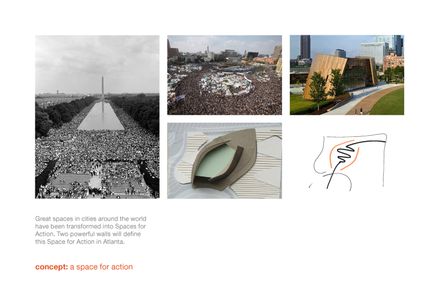
National Center for Civil and Human Rights
National Center for Civil and Human Rights
HOK + The Freelon Group (Now part of Perkins+Will)
ARCHITECTS
Hok, The Freelon Group (Now part of Perkins+Will)
PLUMBING
Newcomb & Boyd
EXHIBIT FABRICATOR
Design & Production
ARCHITECT OF RECORD
Hok
MANUFACTURERS
Terrazzo & Marble, Trespa, Zone Display Cases, Miller Clapperton
ELECTRICAL
Davis Pullen Engineers Inc
LIGHTING CONSULTANTS
Fisher Marantz Stone
EXHIBIT LIGHTING
Fisher Marantz Stone
PROJECT MANAGER
Gude Management Group, Cousins Properties
LANDSCAPE
Hok
CONTRACTOR
H.j. Russell & Company, C.d. Moody Construction Company, Holder Construction Company
CIVIL
Long Engineering
MECHANICAL
Newcomb & Boyd
STRUCTURAL
Walter P Moore And Sykes Engineering
DESIGN ARCHITECT
Phil Freelon
PLAZA SCULPTURE
Larry Kirkland Studio
MECHANICAL AND PLUMBING
Newcomb & Boyd
COST ESTIMATOR
Cost Plus
EXHIBIT DESIGN
Rockwell Group
HUMAN RIGHTS EXHIBITION CURATOR
Jill Savitt
MEDIA CONTENT
Batwin + Robin
INTERACTIVE CONTENT
2nd Story
EXHIBIT GRAPHICS
Rockwell Group, Mgmt
LOCATION
Atlanta, United States
CATEGORY
Cultural Architecture, Public Architecture, Cultural Center
Text description provided by architect.
The design of the National Center for Civil and Human Rights is driven by the concept of creating a Space for Action.
The design is inspired by great urban spaces from around the world that are synonymous with historic civil and human rights events:
With almost 30 feet of elevation change, the design offers at-grade entrances on two building levels.
These powerful walls create and define the Space for Action where the Center and its various programs and interactive exhibits remind us of civil rights accomplishments and make us aware of current, global human rights issues
Located adjacent to the World of Coca-Cola and the Georgia Aquarium in downtown Atlanta.
The iconic form of the Center is defined by two bold, curving walls.
The National Mall in Washington, Tiananmen Square in Beijing and Tahrir Square in Cairo.
The Center’s design is inspired by the links that connect and empower individuals and groups of seemingly divergent interests to find common ground.
Boulevard that features an elegant glass and steel water sculpture celebrating civil and human rights.
The upper-level plaza faces Pemberton Place, an elliptical pedestrian park that links The Center to other major Atlanta cultural venues.
The stairway and terraced landscape overlook an area planted with indigenous grasses intermingled with native shade trees.
The 42,000 square foot building program is arranged on three levels with gallery and event space on each.
A grand exterior stair wraps the building’s east side connecting the upper and lower plazas.
Visitors access the primary building entrance and lobby from Pemberton Place – on the middle floor of the three story structure.
From this lobby, one can enter the Civil Rights exhibit and galleries.
A stairway leads visitors up to a sweeping balcony overlooking the lobby, Centennial Olympic Park and downtown Atlanta beyond.
Both the Civil Rights and Human Rights exhibits culminate on the upper floor in a gallery of shared accomplishments that opens to the balcony and lounge.
A monumental stair connects the lower level to the main lobby above.
An array of east-facing windows along this path brings daylight deep into the building.
A green roof features an extensive planting system that contributes to the sustainable design.
Reflecting the diversity of humanity, the two curving walls that define the building’s form are clad in architectural panels of varying size and earth tones.































